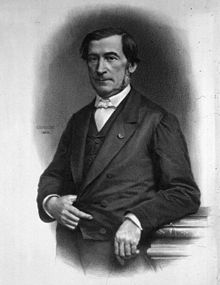|
Apollinaire Bouchardat Apollinaire Bouchardat (July 23, 1809 – April 7, 1886) was a French pharmacist and hygienist born in L'Isle-sur-Serein. BiographyHe studied at the Ecole de pharmacie de Paris and the Muséum d'Histoire Naturelle, and later became chief pharmacist at the Hôtel-Dieu de Paris, where he worked for much of his career. In the mid-1850s he became professor of hygiene at the Faculté de médecine. Among his written works was the popular "Nouveau Formulaire Magistral", a formulary that was published over many editions. It contained information about health spas and pharmaceutical formulae that included natural cures and remedies for all types of ailments. Beginning in 1840, he was editor of the journal "Annuaire de thérapeutique, de matière médicale de pharmacie et de toxicologie".[1] In 1877, with Alexandre Lacassagne and Émile Vallin, he was a founding member of the "Société de Médecine publique et d'Hygiène professionnelle"[2][3][4] DiabetesBouchardat is often credited as the founder of diabetology, and was a major figure involving dietetic therapy for treatment of diabetes prior to the advent of insulin therapy. He recognized that fasting was a method to reduce glycosuria, and speculated that the principal cause of diabetes was located in the pancreas. In the treatment of the disease, he stressed the importance of exercise, and developed a procedure for self-testing urine to determine the presence of glucose. Bouchardat developed a low-carbohydrate diet for his diabetic patients.[5] Bouchardat's low-carbohydrate diet included high amounts of fat and protein, a bottle of red wine, days of complete fasting and outside exercise.[6] He suggested that once all carbohydrates had been removed from the diet they could be partially reintroduced after the disappearance of glycosuria which could be detected alone by patients tasting their own urine.[6] Associated eponym
Principal works
ReferencesWikimedia Commons has media related to Apollinaire Bouchardat.
|